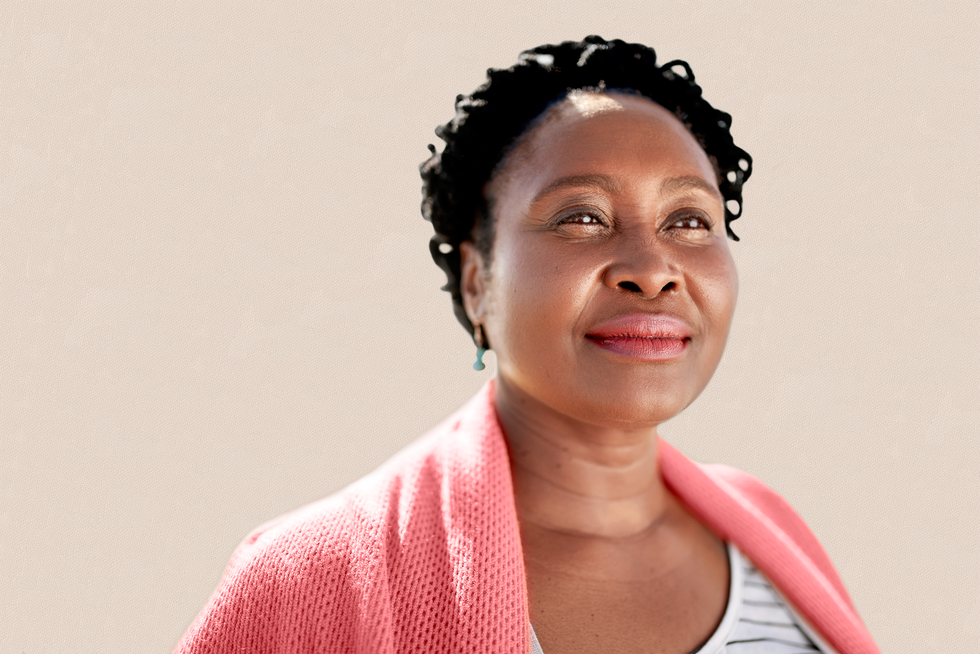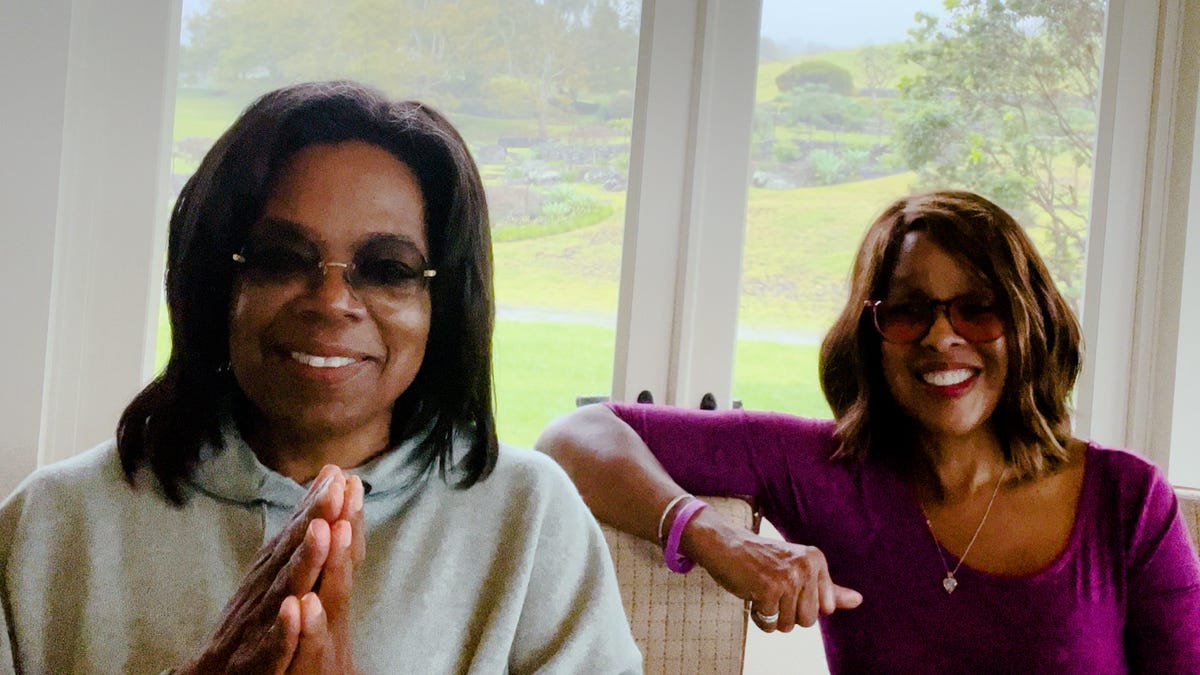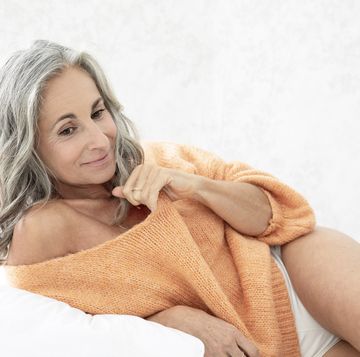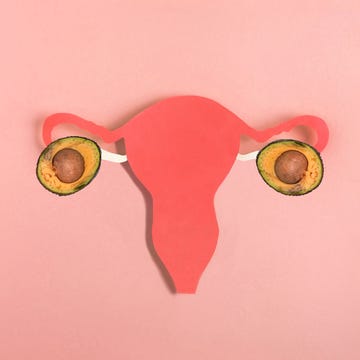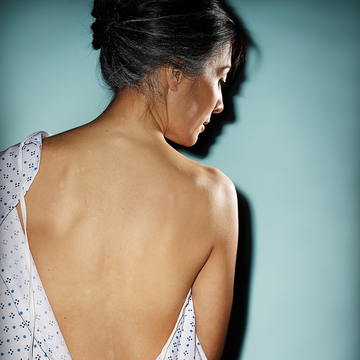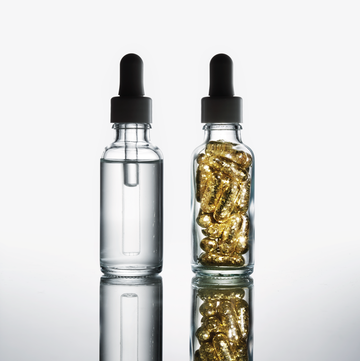As the creator of Black Girl's Guide to Surviving Menopause podcast and social media project, Omisade Burney-Scott, 55, has two missions. The first is to normalize menopause, a natural event that will happen to more than half of the population yet still remains shrouded in silence. The second: to center the voices of Black women and gender-expansive individuals, who experience many of the same symptoms that white women do—hot flashes, insomnia, joint pain—but often do so in a very different (and usually more intense) way.
Hers is an enormous undertaking, with 50 million+ U.S. women, women-identifying people, and nonbinary people currently in menopause—defined as the end of one’s menstrual cycles—and millions more in perimenopause, the four to 10 years leading up to it. More than a third of these are women of color, yet this universal hormonal phenomenon is rarely discussed within their communities, and the experiences and stories of Black and Latinx women are rarely centered in the media or by physicians, according to Denise Pines, Immediate Past President of the Medical Board of California and founder of WisePause Wellness, a pro-aging platform.
“When we read about menopause, we think of white women’s menopause [experiences] because those are the stories that get told,” Pines says. But while our biology may be the same, our experiences are not. Black and Latinx women enter menopause earlier and have longer-lasting, more intense symptoms. Hispanic women are more likely to report feeling bothered by vaginal dryness, urine leakage, and increased heart rate, whereas Black women frequently cite hot flashes and night sweats, according to the Study of Women’s Health Across the Nation (SWAN), a decades-long study examining the health of midlife women across ethnicities.
Burney-Scott notes that news reports will often briefly mention the fact “that Black and Latinx women have longer and more intense symptoms of menopause” but “then there is a hard stop. What about the why?”
Earlier menopause, worse symptoms
The average age of menopause in the U.S. is 51. SWAN findings reveal that Black women tend to begin menopause about nine months earlier than white women. Other SWAN findings show that Black and Hispanic women endure hot flashes for several years longer than other racial and ethnic groups (10 years and nine years, respectively, versus 6.5 for non-Hispanic white women) and Black women experience irregular bleeding for longer periods of time than white women.
Michelle A. Albert, MD, MPH, professor of medicine at the University of California at San Francisco, president-elect of the American Heart Association, and president of the Association of Black Cardiologists, says this phenomenon, called early-onset menopause, triggers a cascade of events leading to worsened health outcomes for BIPOC women. Cardioprotective estrogen plummets during menopause, meaning all women, regardless of race or ethnicity, experience an increase in heart disease and stroke risk during and after the menopausal transition, but the earlier the age of menopause, the greater the risk. Female hormones “also help to protect you from obesity and insomnia, as well as keep cholesterol levels down, and those are all factors associated with elevated heart disease risk,” too, Albert says. Additionally, early-onset menopause ups the risk of osteoporosis (estrogen helps keep bones strong) and depression.
Black women are also three times more likely to experience premature menopause—menopause before age 40, sometimes caused by smoking or autoimmune conditions such as lupus or rheumatoid arthritis—compared with white women, leading to a 40 percent higher risk of developing coronary heart disease over their lifetime, per research presented at a 2021 American Heart Association (AHA) meeting.
When racism, stress, and menopause meet
A 2022 SWAN study published in Women’s Midlife Health proposes that some of the disparities that exist between white women and women of color in perimenopause and menopause “are likely attributable to structural racism in the U.S.” This link has yet to be definitively proven, notes study coauthor and SWAN investigator Tené T. Lewis, PhD, associate professor of epidemiology at Emory University’s Rollins School of Public Health in Atlanta, but “we know that stress matters.”
Explains Albert, “It’s called allostatic load, which refers to the wear-and-tear from lifetime and ongoing stressors that Black women disproportionately face compared with white women.” Systemic racism, including poor access to healthcare, toxic work environments, unsafe neighborhoods, socioeconomic challenges, and more, can weather the body, over-taxing various hormonal and biological processes and fueling chronic inflammation. This can lead to long-lasting health ramifications, including an earlier, more challenging menopause.
Misconceptions lead to worse care
Despite the fact that Black women enter menopause earlier, and the symptoms last longer, “they are the least likely to leave the office with a prescription for hormone treatment,” says Sharon Malone, MD, Washington, D.C.–based ob-gyn and chief medical officer of Alloy Women’s Health. This may have to do with the common but erroneous belief that Black people have a higher pain tolerance, suggest some experts. “Women of color often go to the doctor and the doctor says, ‘Oh, no, you’re too young [for menopause],’” Pines says, or “they want you to ‘grind it out,’ and women walk away with nothing. Or they assume patients can’t afford hormone replacement therapy or other solutions.” This goes beyond a comfort issue: Symptoms like hot flashes and weight gain can be linked to future heart disease, diabetes, and other serious conditions that are already more prevalent among Black and Latinx women.
Ways to advocate for yourself
Several of the experts interviewed for this story said there are concrete steps BIPOC women can take to help flip the script and improve the odds of an easier, healthier menopausal transition.
- Do what you can to mitigate stress. Higher levels of physical activity help to lower the effects of stress; aim for 30 to 45 minutes a day of moving your body in a way that gets your heart pumping, suggests Albert. Get some friends together and form a track-walking group at your local gym or YMCA. Exercise may also help prevent heart disease, ease hot flashes, boost mood, and support healthy weight management—important because Black and Latinx women tend to have higher rates of obesity than white women, which intensifies hot flashes and night sweats. Stress can also be lessened by “looking toward the things that give you a higher sense of purpose,” Albert says. “For many people of color, Scripture can be an important means to achieve a sense of peace”; mindfulness works, too. Try the Exhale app, an emotional well-being app created by entrepreneur, pastor, and life coach Katara McCarty for Black, Indigenous, and women of color (BIWOC), or take an online yoga class with sexuality educator, menopause mentor, and yoga instructor Gabriella Espinosa.
- If you smoke, try to quit. The Black Women’s Health Imperative notes that Black women who smoke often do so to cope with stress. Smoking is strongly linked with an earlier age of menopause, not to mention heart disease, cancer, stroke, and diabetes—the four leading causes of death among African Americans, per the Centers for Disease Control and Prevention.
- Find a doctor who sees you. The number of Black and Latinx physicians in the U.S. is “dismal,” Pines says, so “it’s not an option” to just “find a doctor of color.” Also disheartening: In a 2019 Mayo Clinic Proceedings study, only 7 percent of medical residents expressed confidence in their ability to counsel patients about menopause. Burney-Scott says word of mouth among close friends is an ideal way to find a trusted, knowledgeable provider. Or use the North American Menopause Society (NAMS) website’s “Find a Menopause Practitioner” feature to locate a nearby provider who practices menopause management, or Black Doctor 24/7. NAMS also provides some educational materials in Spanish, including articles on hot flashes, vaginal dryness, memory problems, and hormone therapy.
- Reframe how you view menopause. A negative outlook on menopause tends to be associated with more frequent and severe symptoms. Yamnia I. Cortés PhD, MD, an assistant professor at the University of North Carolina at Chapel Hill School of Nursing, who studies Latinas, perimenopause, and heart disease, says la menopausia or el cambio de vida can be viewed negatively among Latinas, with many women feeling “a sense of loss that they can’t have babies anymore or that they cannot control their bodies”; Pines adds that the stigma surrounding vaginal dryness and incontinence compounds the problem. In Black communities, though, both Pines and Burney-Scott report an overarching “hallelujah” mentality, as “Black women disproportionately suffer so much with PMS, heavy blood flow, and painful fibroids [that] the notion it will come to an end” is welcome. Of course, experiences and views vary, which is why both feel a more open dialogue and a centering of BIPOC stories is even more imperative.
Malone notes there are plenty of positives accompanying this time of life in general. “For a lot of women, it’s the first time they get to focus on themselves. You’ve been concerned about your children, your job, the lens through which people view you, and trying to live up to those expectations. You get to 55, and it’s freeing.”
Leslie Goldman, MPH, has been covering health and wellness for more than 25 years. She regularly contributes feature stories and essays to O: The Oprah Magazine, Better Homes & Gardens, Real Simple, Parents, Prevention, TheGirlfriend.com, and more. Leslie has authored, co-authored, ghost-written, and ghost-edited several books, including \Brave Girls: Raising Young Women with Passion and Purpose to Become Powerful Leaders;\ \Heart Breath Mind: Train Your Heart to Conquer Stress and Achieve Success;\ \Whole 30s' Food Freedom Forever: Letting Go of Bad Habits, Guilt, and Anxiety Around Food,\ \Locker Room Diaries: The Naked Truth About Women, Body Image, and Re-Imagining the 'Perfect' Body;\ and others. She also speaks at colleges and universities on the topics of body image, media literacy, and female empowerment.
